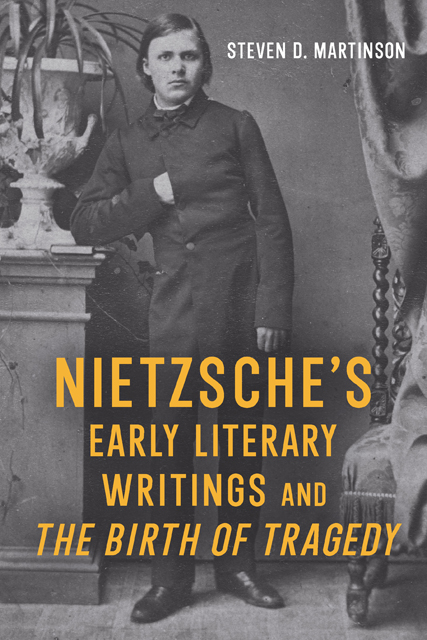3 - The Dramas and Drama Fragments
Published online by Cambridge University Press: 17 December 2022
Summary
As is apparent from his sister Elizabeth's descriptions of their youth, Nietzsche's propensity for playing games, especially those animating the Crimean War, became an essential element of his language from the beginning to the end of his career. As in the case of his extensive early poetry and prose, Nietzsche's dramas and fragments of dramas are not well known. I have therefore included overviews of the dramatic action in these literary works. The analyses and accompanying interpretations should expand our knowledge of Nietzsche's Gesamtwerk while creating possibilities for future research.
Der Geprüfte (The Tested One, 1856; NA I/1, 105–9)
Nietzsche co-authored this playlet with his friend Wilhelm Pinder. They first performed the piece in the Pinder house. It consists of six short parts. The themes the playlet calls up—compassion, hospitality, and honor—are familiar from Nietzsche's prose and poetry. As the drama begins, Jupiter, in disguise and returning from a battle, seeks rest. The mortal Sirenius, not recognizing Jupiter, invites him to warm himself by his fire and gives him food. When he learns that his guest is Jupiter, Sirenius is shocked; he falls to his knees and begs Zeus to have mercy on him for not having been more hospitable to his visitor upon his arrival. Jupiter, however, has Sirenius stand up, assures him of a reward, and points him to the sea. In a meeting of the gods, Apollo asks how “the test” went. Jupiter responds that Sirenius treated him very hospitably and generously. He is to receive a reward for his act of kindness. Jupiter's wife, Juno, will present the gracious host, Sirenius, with a golden neckband. A chorus of water nymphs beckons Sirenius to follow them into the light blue sea. Because he is such a noble person, they wish to tend to his needs. He is to be rewarded with immortality. But Sirenius is cautious. He hesitates to plunge into the ocean with them, for “Es schauert mich wenn ich in die Tiefe sehe” (NA I/1, 106; I shudder when I look into the deep). Sirenius thinks that if he should leap into the depths, it will be like falling into his grave (“Ich spring da in mein Grab”; ibid.).
- Type
- Chapter
- Information
- Nietzsche’s Early Literary Writings and The Birth of Tragedy , pp. 162 - 185Publisher: Boydell & BrewerPrint publication year: 2022



